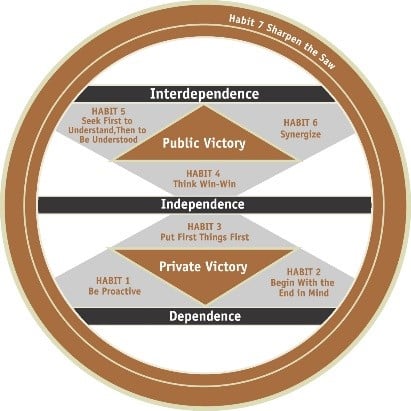Planning With Purpose
Author: Tom Hewlett
November 9, 2016

The end in mind for this post is to (1) motivate you and (2) provide tools to help you make specific plans for living effectively and interacting successfully with other people.
We Need Each Other!
A significant part of the beauty of The 7 Habits of Highly Effective People is most immediately realized when we look at them through the lens of Stephen Covey’s “Maturity Continuum.” In this model of the seven core principle-centered behaviors, we see two key points:
 The habits are not random. They naturally build on each other. If they had not been arranged in a chronological pattern, the title of the book would have been different; perhaps The 7 Random Habits of Fairly Effective People would have been more appropriate.
The habits are not random. They naturally build on each other. If they had not been arranged in a chronological pattern, the title of the book would have been different; perhaps The 7 Random Habits of Fairly Effective People would have been more appropriate.- The habits reside within an overarching architecture of moving from immaturity (dependence), through a higher order of maturity (independence), to maturity of the highest order (interdependence).
The goal is to become effective at living in society, which is an interdependent reality, as we reside among a lot of other people.
“What do we live for if it isn’t to make life less difficult for each other?” ―George Eliot
Let’s Work Together!
Since we reside in a world populated with a lot of other people as we are on our own personal journey to pursue our powerful purpose, it would be smart to proactively plan to build good relationships with those in our circles.
Common key relationships in the school community for any teacher naturally include students, parents, families, team members, support staff, and administrators. Outside of the school community in the personal life of a teacher, relationships will vary somewhat, but likely would include some combination of family, significant others, friends, and associations in civic or social activities, hobbies, and avocational pursuits. Frankly, that is a lot of person-to-person contact. This leads us to two self-evident facts:
- Our ability to get what we want in life is largely impacted by other people.
- The quality of those relationships is defined by the level of mutual respect, open communication, and collegiality enjoyed in each one-on-one relationship. Notice the ties to Habits 4, 5, and 6.
“The key to the many is the one, and everyone is a one.” ―Stephen R. Covey
Planning with Purpose Pays Off!
Weekly planning is a discipline that, perhaps more than any other, has the potential to produce a sense of accomplishment, productivity, and peace in our lives.
“We must all suffer from one of two pains: the pain of discipline or the pain of regret.” —Jim Rohn
Our study of the 7 Habits has taught us that there are three steps to effective weekly planning:
- Review your mission and roles.
- Set Big Rock goals in each of your roles for that week.
- Put those Big Rock goals in your planning system.
Relationship building is a key part of effective teachers’ planning. Relationships are much like plants, in that they must be nurtured in order to continue to grow and remain productive. Taking relationships for granted is much like ignoring a favorite plant, assuming it will continue to bloom or bear fruit without our caring for it with regular watering, and failing to provide the nutrients it needs. To effectively live in the interdependent reality, we should make plans to improve the quality of our key relationships through intentional care and nurturing.
Here is a six-step process of effective planning to nurture relationships:
- Make a list of your most important roles (e.g., teacher, parent, team lead, coach, volunteer, artist, pet owner, musician, citizen, friend).
- Under each role, list the names of people with whom you have a relationship in that role (e.g., for “teacher”: students, parents/families, support staff, administration).
- Rate the quality of every relationship on a scale of 1 to 10 (1 = poor, 10 = exceptional).
- Chose two-to-three relationships that need your attention right away.
- Make a list of potential deposits you could make in the Emotional Bank Account of each of those you are focusing on for the week.
- Decide what you will do this week, when you will do it, and put a note in your planning system to remind you.
Keep in mind that your goal could be more of a focus for the week than a task. For example, your goal for this week could be to really focus on listening to your daughter every day and creating opportunities for dialogue. Or it could be a task to make a date with your daughter to go shopping or to a movie. Likewise, the classroom goal for the week could be to make five positive phone calls to give parents good news about something their children did at school. That will require that you focus on catching students doing great things this week. Or it could be a task to leave a thank-you note for the custodian letting him know how much you appreciate the care he takes in cleaning your room.
By establishing the discipline of never taking relationships for granted and planning on a weekly basis to focus attention on a few key relationships you can plan to nurture, your capacity to get important things done in an interdependent reality will be profoundly enhanced.
“How different our lives are when we really know what is deeply important to us, and, keeping that picture in mind, we manage ourselves each day to be and to do what really matters most.” —Stephen R. Covey, The 7 Habits of Highly Effective People
Share Article on
Tags: 21st century education, emotional intelligence, professional development, school climate, school culture, teachers, The Leader in Me, whole-child education
